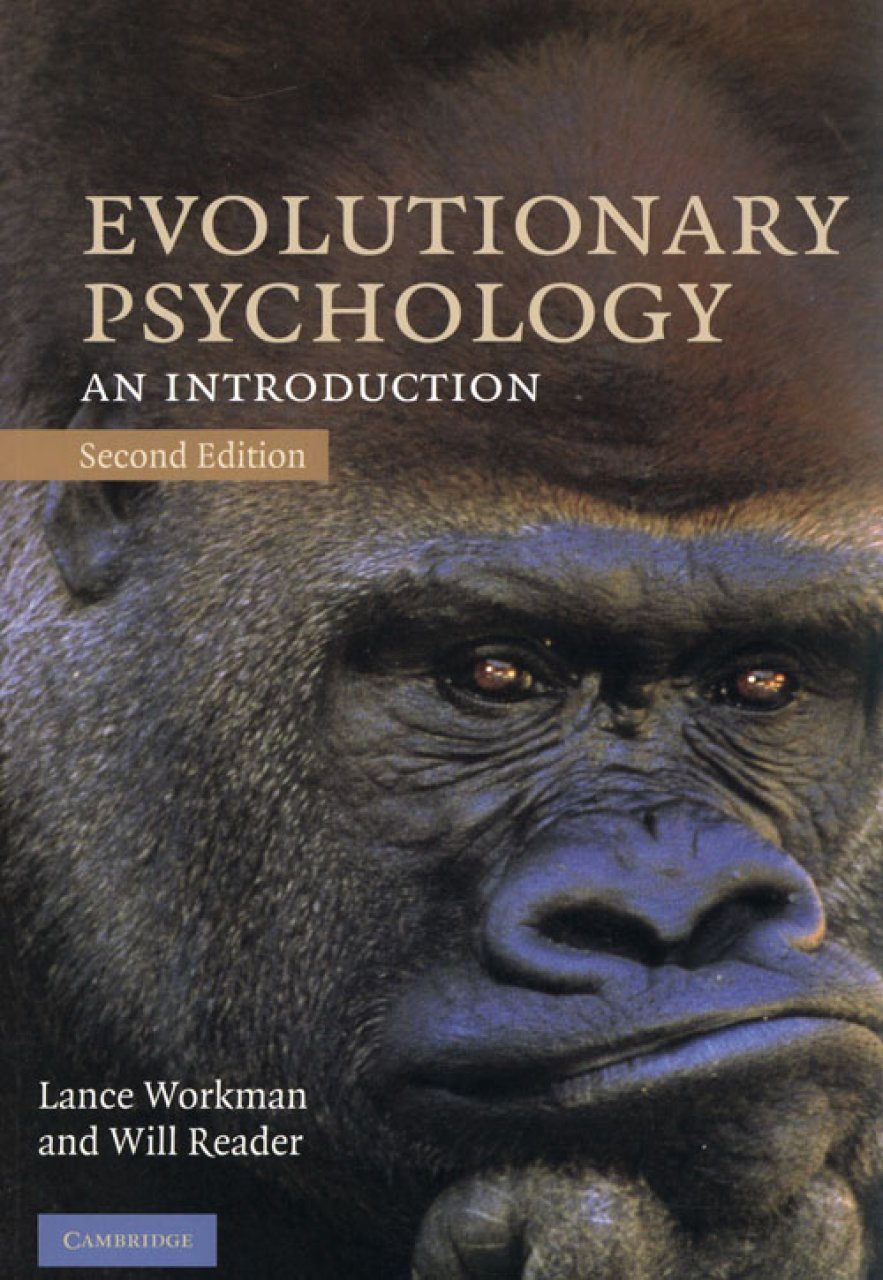Define evolutionary psychology. evolutionary psychology synonyms, evolutionary psychology pronunciation, evolutionary psychology translation, English dictionary definition of evolutionary psychology. The branch of psychology in which aspects of brain structure, cognition, and behavior are interpreted as evolutionary adaptations to the. Notes to Evolutionary Psychology. Buller refers to evolutionary psychology as a paradigm. We adopt Laudans research tradition terminology as research traditions have a more fluid structure than paradigms and Laudan allows for sharing of theoretical resources between research traditions. Evolutionary Psychology Is a Superpower By Glenn Geher Ph. on August 28, 2018 in Darwin's Subterranean World The evolutionary perspective on life. Evolutionary Psychology News has 50, 261 members. 'Evolutionary Psychology News' is a group for the dissemination of news and discussion of Evolutionary A lecture on Evolutionary Psychology, with specific examples from language research. Slideshare uses cookies to improve functionality and performance, and to provide you with relevant advertising. If you continue browsing the site, you agree to the use of cookies on this website. Evolutionary Psychology: Genes, Environments, and Time is an extremely studentfriendly textbook that explores with depth all the central topics in evolutionary psychology, integrating perspectives from psychology, ethology, evolutionary biology, anthropology, and zoology. This is a uniquely written text that combines humour and thoughtful. Evolutionary psychology aims the lens of modern evolutionary theory on the workings of the human mind. It focuses primarily on psychological adaptations: mechanisms of the mind that have evolved to solve specific problems of survival or reproduction. Evolutionary psychology is one of many biologically informed approaches to the study of human behavior. Along with cognitive psychologists, evolutionary psychologists propose that much, if not all, of our behavior can be explained by appeal to internal psychological mechanisms. Evolutionary Psychology is an open access, peerreviewed journal which focuses on original, empirical research addressing human psychology guided by an evolutionary perspective. This journal is a member of the Committee on Publication Ethics (COPE). Some people think that evolutionary psychology claims to have discovered that human nature is selfish and wicked. But they are flattering the researchers and. Evolutionary Psychology Is a Superpower By Glenn Geher Ph. on August 28, 2018 in Darwin's Subterranean World The evolutionary perspective on life allows. Evolutionary Psychology, Biological Anthropology, Evolutionary Anthropology, Syllabus Theory of Mind It is the capacity to represent mental states of oneself. Topics include evolutionary psychology and its application to consumer behavior, nomological networks of cumulative evidence, and public engagement. This conversation took place on. In its broad sense, the term evolutionary psychology stands for any attempt to adopt an evolutionary perspective on human behavior by supplementing psychology with the central tenets of evolutionary biology. The underlying idea is that since our mind is the way it is at least in part because of our evolutionary past, evolutionary theory can aid our understanding not. The goal of research in evolutionary psychology is to discover, understand, and map the human mind as well as to explore the implications of these new discoveries for other fields. The eventual aim is to map human naturethat is, the speciestypical architecture of the human. Evolutionary psychology is an approach to studying psychology. It applies principles of evolutionary biology (Darwin, 1859), in particular the logic of adaptationism (Williams, 1966), to derive and test hypotheses about the design and operation of the human mind. A philosopher subjects the claims of evolutionary psychology to the evidential and methodological requirements of evolutionary biology, concluding that evolutionary psychology's explanations amount to speculation disguised as results. Richardson's arguments are informed, informative, and incisive. Evolutionary psychology is an approach to the psychological sciences in which principles and results drawn from evolutionary biology, cognitive science, anthropology, and neuroscience are. Evolutionary Psychology welcomes papers on the application of evolutionary theory to all aspects of psychology including (but not limited to) sex differences, visual perception, the role of hormones in behavior, applied or organizational psychology, personality variation and models, crosscultural research, comparative analyses, interpersonal. Evolutionary Psychology IS an explanatory framework that has implications for understanding all psychological phenomena. It essentially conceptualizes humans as products of natural selection thereby NOT conceiving of our species as somehow immune from the laws that govern the natural world. Evolutionary psychology is related to other fields of science like sociobiology, social psychology, and sociocultural anthropology. Evolutionary psychologists argue that much of human behaviour is the result of adaptations which evolved to solve recurrent problems in human ancestral environments. Evolutionary Psychology (EVP) is an open access, peerreviewed journal which focuses on original, empirical research addressing human psychology guided by an evolutionary perspective. Please see the Aims and Scope tab for further information. Psychology (capitalized) to distinguish it from the eld of inquiry (evolutionary psy chology), is the focus of this chapter. The basic tenet of Evolutionary Psychology is. Evolutionary psychology is the science that seeks to explain through universal mechanisms of behavior why humans act the way they do. Evolutionary psychology seeks to reconstruct problems that our ancestors faced in their primitive environments, and the problemsolving behaviors they created to meet those particular challenges. Current research on the evolution and development of cognition and affect, including intuitive physics, biology, and psychology, language, emotions, sexuality, and social relations. Evolutionary psychology is a hybrid discipline that draws insights from modern evolutionary theory, biology, cognitive psychology, anthropology, economics, computer science, and paleoarchaeology. The discipline rests on a foundation of core premises. Evolutionary psychology definition, the branch of psychology that studies the mental adaptations of humans to a changing environment, especially differences in behavior, cognition, and. Evolutionary Psychology has 34, 282 members. Evolutionary psychology is a hybrid discipline that draws insights from modern evolutionary theory, biology. Evolutionary psychology is a relatively new scientific discipline that looks at how human nature has evolved over time as a series of built up psychological adaptations. Many evolutionary biologists and other scientists are still reluctant to recognize evolutionary psychology as a valid science. What is evolutionary psychology The discipline that considers psychological and behavioral phenomena as products of natural selection. Explores the implications of Darwinian theory for explaining behavior. Evolutionary psychology is an approach to psychology, in which knowledge and principles from evolutionary biology are put to use in research on the structure of the human mind. It is not an area of study, like vision, reasoning, or social behavior. Gender ideology about care may be less important than feelings on these matters. The study, in the January issue of the Journal of Social, Evolutionary, and Cultural Psychology, was conducted by Steven Rhoads, a political scientist at the University of Virginia and his son, Christopher Rhoads, an assistant professor of education at the. Evolutionary psychology definition is the study of human cognition and behavior with respect to their evolutionary origins. the study of human cognition and behavior. Evolutionary psychology is a scientific discipline that approaches human behavior through a lens that incorporates the effects of evolution. It combines the science of psychology with the study of biology. Evolutionary psychology, which emerged in the late 1980s, is a synthesis of developments in several different fields, including ethology, cognitive psychology, evolutionary. Evolutionary Psychology Anthropology Update 2018: I first posted these reflections on Evolutionary Psychology and Anthropology in July 2011 using the article Darwin in Mind. I then revisited and republished the post in August 2012 when I was writing a section on Human Nature. Developmental and Evolutionary Psychology Faculty and graduate students working and studying in this area are concerned with the developmental and evolutionary origins of human thought and behavior. Neuroscience and Behavior Evolutionary psychology is one of the most interesting theories to come out of Charles Darwins discovery of evolution. Like evolutionary physiology, its an attempt to explain human nature as the result of adaptations to the environment through natural and sexual selection. Evolutionary psychology (EP) attempts to explain how and why complex human behaviours emerged as a result of evolution of the humans and the human brain. This includes fitness advantages that such behavior gives, i. In the broadest sense, behaviors or social constructs are seen as adaptations in the same way as physical adaptations. A video about Evolutionary Psychology, that hopefully explains the basics and dispels a few myths. Natural selection and the theory of evolution Survival of the fittest: the case of finches on the Galapagos Islands The pace of evolutionary change Evolution of. Evolutionary psychology provides a metatheory for psychological science that unites these fields, and justifies why the seemingly disparate branches of psychology truly belong within the covers of introductory psychology books and within the same departments of psychology. The field of evolutionary psychology, which studies the function and development of the mind from an evolutionary perspective, has made great strides in explaining human physical attractiveness and. However, the central guiding assumption of evolutionary psychology is that the behaviors observed in presentday society are those that were selected for evolutionary time (Buss, 1995; Buss. Evolutionary psychology is a theoretical approach to psychology that attempts to explain useful mental and psychological traitssuch as memory, perception, or languageas adaptations, i. A central claim of evolutionary psychology is that the brain (and therefore the mind) evolved to solve problems encountered by our huntergatherer ancestors during the upper Pleistocene period over 10, 000 years ago. Evolutionary Psychology: The New Science of the Mind He begins with a complete and intelligent introduction to both evolutionary theory and the events leading to the development of an evolutionary psychology. Thereafter, he covers broad branches of human behavior kin relations, cooperative relationships, warfare, aggression, status. Evolutionary psychology provides researchers with a framework for understanding the neurochemical applications of the human mind. The basic assumption of this theory is that evolution has endowed us with a suite of psychological mechanisms that have allowed us to solve the adaptive problems of our evolutionary past..











